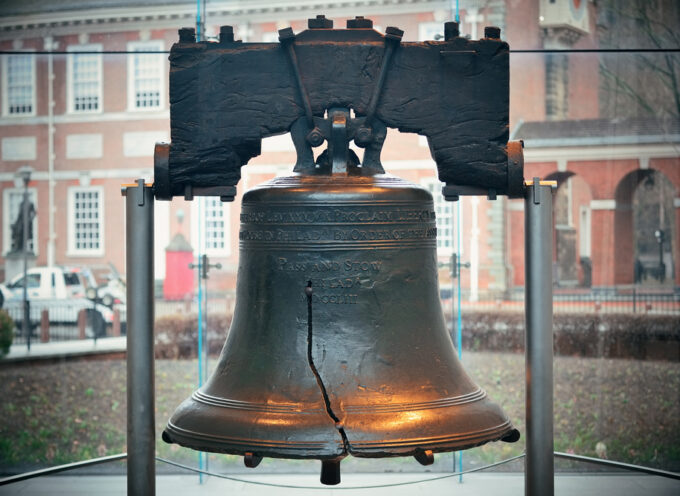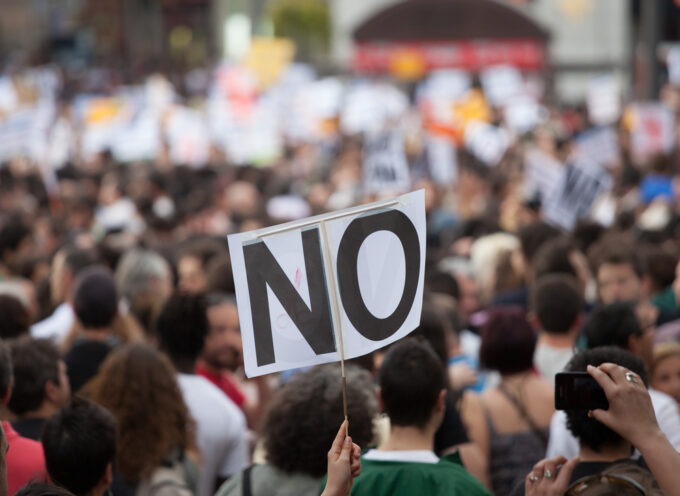In recent years, both Republicans and Democrats have experienced a surge of populism—the uprising of ordinary citizens against powerful “elites” who they view as overbearing, self-serving, and out of touch—within their political parties. For that reason, Christianity Today recently asked me if I would create a list of five helpful resources for understanding today’s American populism. In the article (which can be accessed by clicking here) I listed, linked to, and gave a brief description of my choices: J. D. Vance’s Hillbilly Elegy, Salena Zito and Brad Todd’s The Great Revolt, John B. Judis’ The Populist Explosion, David Koyzis’ Political Visions & Illusions, and Richard Mouw’s Uncommon Decency.
Yet, if R. R. Reno’s Return of the Strong Gods had been available at that time, I would have knocked one of those books off of the list and placed Reno’s at the top. Return of the Strong Gods is part diagnosis and part prescription. Reno’s diagnosis is that the traumatic nature of the twentieth century’s world wars caused Americans on the left and right to embark upon a campaign against anything that smacked of fascism, authoritarianism, totalitarianism, or racism. And rightly so. The American leadership class wanted to dissolve beliefs and loyalties that feed the tendency to worship blood, soil, and race.
Seventy years later, Reno argues, fascism and communism are not the primary threats to our civilization. The primary threat is the attempt by many on the left to deregulate culture by minimizing or erasing moral and social norms and the mirror attempt on the right to deregulate the economy by erasing anything that hinders major corporations, even if such erasure harms significantly America’s working class.
Reno’s prescription is that America’s leadership class must bring back the “strong gods,” meaning rightly ordered affections for God, transcendent truth, the family, and one another as members of the same nation. We must regain the idea of a “common good,” as opposed to the mere individualism of liberalism and libertarianism or the identity politics of progressivism and the alt-right.
The Postwar Consensus
In Chapter One, “The Postwar Consensus,” Reno jousts with several opponents, but none more so than left-leaning philosopher Karl Popper. Popper wanted to weaken people’s affections for their own nations, rid the public square of philosophies and theologies that claim to know the truth, and restrict the label “truth” for claims that are empirically falsifiable. Reno also criticizes left-leaning thought leaders such as Arthur Schlesinger and others who wanted to discard political philosophy in favor of social scientific policy making, urban planning, and social engineering.
Next, Reno takes on right-leaning thinkers Friedrich Hayek and William F. Buckley, Jr. Hayek warned against the tendency of Western governments to build command-and-control governments, centralize power, and stagnate economies. In Hayek’s opinion, we should ward off the impulse toward central power and collectivism by rejecting strong forms of political philosophy and theology and imagining society as a collection of atomized individuals. Reno is more favorable of Buckley, noting that Buckley’s excessive individualism was modified by his insistence on the importance of Christian faith and the limited value of pluralism (i.e. that pluralism is a relatively good means but not a good end).
Therapies of Disenchantment
Chapter Two, “Therapies of Disenchantment,” focuses on how the postwar mentality of weakening society’s strong loves produced a “way of critique” that lead society into a mushy relativism, and a “way of reduction” that teaches society that its deepest political problems can be solved by scientists and managers.
The way of critique was taught to us by thinkers such as Friedrich Nietzsche (philosophy), Sigmund Freud (psychotherapy), and Karl Marx (economics, political philosophy). Each of these “masters of suspicion” helped to further weaken society’s love of God and truth. Each of them wanted to solve social problems without reference to the transcendent or sacred.
The way of reduction was given to us by thinkers such as Hayek (already mentioned), Albert Camus (a French philosopher) and Jacques Derrida (Algerian philosopher). Hayek, Camus, and others wanted society to avoid focusing on big things like God or nation or the common good. Instead, they wanted us to seek more limited individual goods such as personal wealth. We must so “small” instead of “big” or else we open the door to fascism. Or so the argument goes.
Weakening as Destiny
The third chapter, “Weakening as Destiny,” argues that, even though the West won the Cold War, it immediately began to lose itself and its culture because it didn’t adapt its cultural and political strategy to new post-Cold War challenges. “Unrestrained by the existential threat of communism,” Reno writes, “the Western postwar consensus tended toward pure negation, leaving us a utopian dream of politics without transcendence, peace without unity, and justice without virtue.”
Reno’s antagonist in this chapter is Gianni Vattimo, a “highbrow propogandist” and “rhetorician” whose writings reinforce the postwar consensus. Drawing upon Martin Heidegger (German philosopher), Vattimo wants us to reject strong forms of religion and philosophy that try to identify the essence of things and try to base morality on transcendent moral laws. In other words, Vattimo is yet another philosopher of disenchantment, a thinker who wants to build society without reference to the transcendent. Yet, unlike Heidegger, who viewed disenchantment as a cold, hard, fact that could be overcome, Vattimo embraces disenchantment as the solution. Disenchantment removes from our shoulders the burden of having deep convictions about transcendent truths.
Many of America’s elite leaders on both the left and the right, Reno argues, follow the same pattern as Vattimo. They want to weaken our deepest loyalties and cause us to be “open” to nearly everything. For them, the key to our social ills lies in the hands of experts and social scientists who can provide empirical solutions to our problems. Center-right people are non-interventionist and like to deregulate the economy so that we can experience the benevolent governance of economic freedom. Center-left people tend to focus more on deregulating culture by weakening moral norms and engaging in politically-motivated social engineering.
The Homeless Society
The fourth chapter, “The Homeless Society,” argues that, “The West is reaching a dead end because our leadership class, socialized into and loyal to the postwar consensus, insists that we must be homeless—even as it shelters itself.”
In this analogy, the leadership class wants to weaken or dissolve the strong loyalties, loves, and beliefs that have shaped human beings historically. On Reno’s architectural analogy, it wants to tear down the boundaries and walls that give the structure of our national “home.” They want to tear down even the historical consensus and biological/chromosomal reality of gender distinction.
Reno also uses a rock-climbing metaphor, arguing that young people enter an intensely competitive marketplace and disorienting world. “Feeling as though they are forever climbing a steep precipice without a safety rope, they find no stability, no rest—no home.” But nobody really wants to live this way as it is perpetually exhausting and disorienting.
Populism is the rejection by the masses of these “open,” destabilizing ways of the elite. Why does populism distress the leadership class? Precisely because it is a rejection of the postwar consensus. It’s more than merely a rebellion against indiscriminate mass immigration and authoritarian codes of political correctness.
Reno concludes the chapter by arguing that our leadership elite can shelter themselves quite easily from the consequences of economic and cultural deregulation, but the working class and middle class cannot. For them, deregulation is hell. It hurts them economically and disorients them socially and culturally.
Thus, with strong forms of familial, religious, and national identity dissolving, identity politics steps in to fill the void. Reno is worth quoting at length:
The trajectory is plain to see. The more our leadership class has championed diversity and multiculturalism, the more powerful identity politics has become. Those who gravitate toward ‘identity’ have the correct intuition that solidarity requires a shared loyalty. Because the relentless pursuit of the open-society agenda deprives them of a strong civic identity, they fall back on race, sex, sexual orientation, or some other ‘identity,’ a process that reinforces and is reinforced by the postwar consensus. Identity politics accentuates the differences that diversity and other therapies of openness promote and redirects our desire for solidarity by focusing it on DNA (race and sex) and sexual practices.
The chapter concludes with a plea to political leaders to be loyal to lower- and middle-class citizens by working hard on their behalf to make our nation more hospitable financially and culturally.
The Return of the Strong Gods
The concluding chapter, “The Return of the Strong Gods,” concludes that our nation is now finally recognizing that the gods of Reason, Science, and Progress are impotent. We must pray for a revival of Christianity, although not for a theocracy, and we must also work to strengthen beneficent loyalties such as truth, country, and family. We are made for love and loyalty and thus must not allow ourselves to be reduced to economic agents with personal preferences.
We cannot, Reno argues, face today’s crisis by dismissing it, blaming economic factors, or bemoaning social malaise. There is merit to some of those factors, but we must also ask serious political questions such as: How can we make the global economy work for those struggling in the West? How can we renew a shared moral community that helps protect the wayward among us from self-destructive vices? What is the most appropriate response to the trend toward mass immigration? Should we limit globalization? What role should the nation-state play in the twenty-first century?
The answers to these questions, Reno argues, must be answered by “us”—meaning both the leadership class and the rest of us. The pronoun “we” is indispensable, signifying our need for solidarity in community. God created us to live in community. The “we” therefore, has sacred significance that translates into social order, causing us to love our native languages and motherlands or fatherlands. The “we” transcends biology, allowing immigrants to assimilate and become part of our national culture.
As Augustine defines “we” in City of God, it is “an assembled multitude of rational creatures bound together by a common agreement as to the objects of their love” (19.24). But the postwar consensus is afraid of love because it fosters ambitions, inspires sacrifices and, at worst, can cause us to sacrifice others. This consensus wants to weaken the objects of our love and weaken our love toward its objects.
If “we the People” do not find a way to strengthen the “we,” to combat the elite consensus that works for them but not for us, then the perverse gods of blood, soil, and identity will indeed gain wider traction. Ironically, it is the elite leadership’s attempt to avoid totalitarian regimes through a strategy of weakening and relativizing that eventually breeds inhumane and authoritarian politics. Thus, for Reno, our nation must continually ask, “Who are we?” and “Who do we want to become?”
Further, we must avoid the opposite extreme of idolizing the nation, of viewing it as our savior. To combat such idolatry, we must revive two other sources of identity and solidarity: families and religious institutions. We must pursue a strategy of strengthening family, religion, and nation.
Reno concludes on a hopeful note. “Repairing…our home and inheritance…will be painfully difficult,” he writes. “Our task is to use our freedom and intelligence in doing so. We must return to the terrain that can be stabilized, though never finally fixed. This is a religious, cultural, and political task. It is ours.”
Reflections on Return of the Strong Gods
Although this essay will not provide a full evaluation of the book, I will take a few moments to reflect on its contents.
What would I do differently if I were writing the book? I’d articulate my qualified appreciation for free markets even while rejecting economic libertarianism. I’d spend more time reflecting on the real prejudices against, and injustices committed toward, American minorities in the past, prejudices and injustices that also play a role in the rise of identity politics. In the last chapter, I’d be more specific in the last about how (and how not) to bring back the strong gods, about the limits on how we should try to re-regulate the economy and our culture.
Yet, I want to focus on the many instructive features of the book.
The book’s thesis is plausible and many of its lines of argument are exactly right. It is a well-researched, well-written, multi-layered book that places blame on many of our nation’s irresponsible elite leaders and points a constructive way forward. As I’ve written elsewhere, liberal and libertarian ideologies are not the best path. Instead, we need a non-ideological political arrangement that provides as much liberty as possible while also seeking the common good by strengthening familial, religious, and national institutions.
We must strengthen the family. It is the first institution to appear in the Bible and in history. It is the most basic social institution and plays the most significant role in the health of a child and in the health of a nation. When the family is weakened, so is the rest of society and all of its other cultural institutions. And, as Mary Eberstadt has recently argued, the American family’s dissolution is the most important factor in our nation’s political polarization.
We must strengthen our churches. The church is ordained by God to disciple his people, to be the locus of our spiritual formation. In the political sphere, there are two ways the church’s witness is relevant. As a formal institution that gathers weekly, its primary political witness is its declaration that Jesus is Lord and Caesar (and thus, any political leader or party) is not. Rarely should the local church make public policy declarations from the pulpit. While the Bible often speaks directly to ethical issues, it rarely speaks directly to the application of its moral teaching to a twenty-first century democratic republic’s public policy. If a preacher is going to climb into a pulpit and declare “thus saith the Lord” about a policy issue, he’d better be certain his words are the words of God.
Finally, we must strengthen our nation. As political philosophers Pierre Manent and Daniel Mahoney have argued, the dominant Western religion or ideology of our era is “the religion of humanity.” In this ideology, human beings are envisioned as intrinsically good, peaceful, and unified. Yet, our original goodness has been corrupted by the rise and development of nation-states. These nation-states are representative of everything that is wrong with humanity. They foster warmongering, religious divisions, economic disparity, and other evils. Thus, as the argument goes, we must bring peace and unity to the world by minimizing or obliterating the nation-state, weakening or undoing its borders, and fostering among global humanity the sense of camaraderie we would have felt if we had not been corrupted by civilization.
This “religion of humanity” was first promoted by French atheist Auguste Comte, who envisioned it as a formal religion for atheists, agnostics, and liberals. As a formal religion, it was derided and rejected. Yet, as an ideology—an informal religion—it has succeeded on a level Comte could never have imagined. Americans should reject this ideology out of hand, as it is not only not only squarely at odds with the Christian faith, offering an essentially a-theistic view of life, a false anthropology, and a heretical and utopian eschatology. It is also aggressively subversive to the health of our nation, its citizens, and its institutions.
As I wrote elsewhere, Christians should seek to persuade our neighbors of the truth of Christianity, the Lordship of Christ, and the existence of the moral law. We should remind them that evil arises from within the human heart; although cultural institutions and governments are indeed warped and corrupted by human sin, they are not the source of sin. Finally, we should draw upon the Bible’s affirmation of both universality and particularity, and consequently its affirmation of unity-in-diversity rather than unity-without-diversity. We should not seek to homogenize the world, to rid ourselves of the particularity offered by individual nations.
When Christ returns, he will affirm the particularity of his worshipers (from every tribe, tongue, people, and nation) even while unifying them under his reign. And in the meantime, until he returns, we do well to realize that it is through the particularities of our existence—families, neighborhoods, communities, institutions, and nations—that we are shaped and even become aware of our common humanity.
Subscribe
Never miss a post! Have all new posts delivered straight to your inbox.







